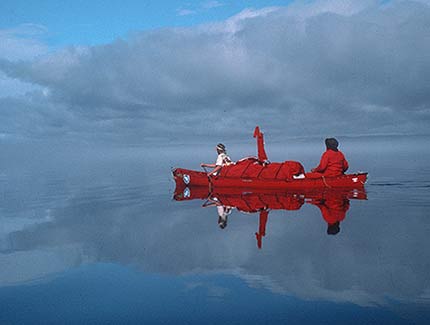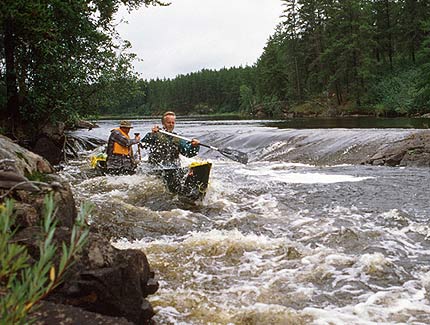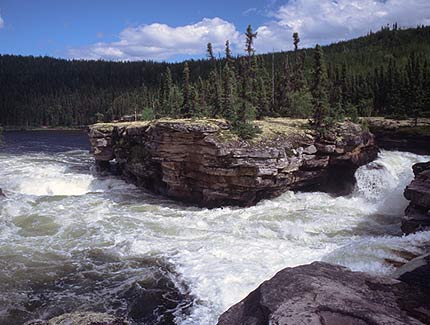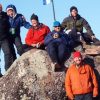Meet Far North Paddler Mel Baughman
Mel Baughman Shares Lessons and Trip Logs from a Notable Far North Canoeing Career
After Mel Baughman went on two canoe trips in Canada’s Far North, he wanted to get rid of all his belongings. He had learned what it was like to live out of a pack and a canoe, and didn’t see the point in extra baggage. While Baughman’s wife moderated that ambition, he says the trips were life-changing in many other ways.
“Being able to use and collect experiences is what’s important to me, not things,” the retired University of Minnesota professor of forestry says.
Since those first two trips, Baughman has since undertaken 19 more trips to rivers and lakes in the vast boreal forest and tundra of Canada’s wildest territory. He recently supplied his trip logs to Canoeing.com to make available as a reference for research and trip-planning. The logs contain a wealth of information on routes, like rapids, navigation, fishing, campsites, and other details that could help future paddlers.

Quoich River
Baughman learned much of how to travel by canoe down wild rivers on his first trip, with Bob O’Hara, the now-retired Minnesota teacher who has paddled 27 Far North Rivers and many other routes, and introduced countless companions to Canadian canoe tripping. That first trip, Baughman had to learn fast. They were descending the Quoich River, in Nunavut, Canada and couldn’t find any report or other evidence anyone had ever traveled down the first half.
“I had to learn everything about type of tent, and food, and packing and organizing for travel, then repack for canoeing, how to line rapids, knowing what you can paddle, what you can’t,” he said.
The more he learned, the more he fell in love with the country and the effect of the long trips. A month in the wilderness is a potent dose of nature.
“Most trips you’re going one to two weeks, the first couple days forgetting what was going on back home, the last couple days, trying to remember what was going on back home,” Baughman says. “On a month-long trip, you are totally focused on the trip, and you see what’s important.”
To do a month on remote rivers, you need a system. Food, gear, schedule, whitewater, transportation in and out, and of course, fishing. Baughman’s trip logs are not just reports of specific routes, but how-to guides on planning and executing a safe and successful trip.
Much of the system is based on Bob O’Hara’s, but he has tweaked it to his taste. He says besides the length of the trip, whitewater is the only big difference in necessary skills from a week in the Boundary Waters. Baughman says the most important ability is assessing rapids.
“People need knowledge to assess what that they can portage, paddle, or line,” Baughman says. It’s also important to have a paddling partner who has the same judgment.
You also need some quality pieces of gear. Baughman uses mountain tents that can withstand the winds of open tundra, packs with good waist belts, and a reliable stove.
“If there’s any piece of equipment that’s going to fail, it’s going to be the stove,” Baughman says.
While he currently uses wading shoes and knee-high waders, he added that he might switch to hip waders in the future.

Gammon & Bloodvein Rivers
While reading his journals is a great way to prepare, he says the best way to do a first trip is to go with someone who has been in the Far North before. Baughman recommends attending the Far North Symposium (every spring in St. Paul, MN) to not just hear presentations about routes and technique, but meet potential paddling partners. That’s where he saw a flier from Bob O’Hara seeking companions for the trip down the uncharted Quoich River in 1989. Baughman eventually served as the coordinator of the symposium for about 10 years.
The second trip Baughman took, he was the veteran. It was the first trip for his three companions, who he also met through the Far North Symposium.
“We had to be self-reliant planning the route and trip and gear and deciding what river we would paddle,” he says.
It was after that trip that he realized how few belongings he really needed. Rather than getting rid of everything, he kept taking trips every summer during his breaks from working. After retiring four years ago, he has started taking more month-long trips. This year, he went on one of the hardest trips he has experienced, once again exploring an unknown route.
This one was down an unnamed stream in Ontario, kept anonymous because of brook trout. What the river offered was deadfall. Every fifty feet, another tree was down across the water and Baughman and his partner would have to portage or drag over or get the axe and saw out and cut their way through. It took them three days to go 7.5 miles.
This spirit of adventure has been a constant in his canoeing career, but he also seeks trips where he can go for a walk, see some interesting sights, and do some photography and fishing. His ideal trip is 13 or 14 miles a day, with some free time.
The most reliable place to find those trips is northern Saskatchewan. The routes are mostly through tundra or jackpine barrens, the landscape is rugged and scenic, bugs aren’t as bad, and the fishing is “tolerable.” He has seen musk ox and caribou, and in addition to brook trout, there are lake trout and Arctic grayling.
The people he paddles with are certainly some of the most important elements of his expeditions. While the trips take wilderness skills, physical strength, and proper equipment, they also demand the right attitude.
“You often face some physical hardships, day after day of rain or burned over landscapes, bad bugs,” Baughman says. “I get dragged down sometimes, get a little grumpy, but people who can maintain a positive attitude through the whole thing are a joy.”
Baughman is busy planning more trips, and open to new partners. He has a long list of destinations, but also welcomes others’ ideas. “There are way more rivers than I can canoe in the lifetime I have left,” he says, but he’s going to paddle as many as he can.

Waterfound & Fond du Lac Rivers










